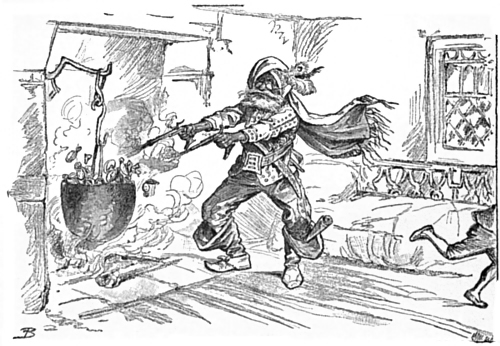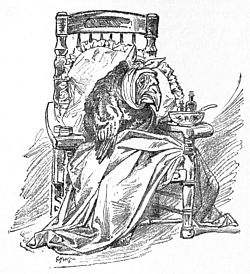Davy and the Goblin/Chapter VII
“Oh, dear!” cried Davy, speaking aloud in his distress, “I do wish people and things wouldn’t change about so! Just so soon as ever I get to a place it goes away, and I’m somewhere else!”—and the little boy’s heart began to beat rapidly as he looked about him; for the wood was very dark and solemn and still.
Presently the trees and bushes directly before him moved silently apart and showed a broad path beautifully overgrown with soft turf; and as he stepped forward upon it the trees and bushes beyond moved silently aside in their turn, and the path grew before him, as he walked along, like a green carpet slowly unrolling itself through the wood. It made him a little uneasy, at first, to find that the trees behind him came together again, quietly blotting out the path; but then he thought, “It really doesn’t matter, so long as I don’t want to go back;” and so he walked along very contentedly.
By and by the path seemed to give itself a shake, and, turning abruptly around a large tree, brought Davy suddenly upon a little butcher’s shop, snugly buried in the wood. There was a sign on the shop, reading, “Robin Hood: Venison,” and Robin himself, wearing a clean white apron over his suit of Lincoln green, stood in the door-way, holding a knife and steel, as though he were on the lookout for customers. As he caught sight of Davy he said, “Steaks? Chops?” in an inquiring way, quite like an every-day butcher.
“Venison is deer, isn’t it?” said Davy, looking up at the sign.
“Not at all,” said Robin Hood, promptly. “It’s the cheapest meat about here.”
“Oh, I didn’t mean that,” replied Davy; “I meant that it comes off of a deer.”
“Wrong again!” said Robin Hood, triumphantly. “It comes on a deer. I cut it off myself. Steaks? Chops?”
“No, I thank you,” said Davy, giving up the argument. “I don’t think I want anything to eat just now.”
“Then what did you come here for?” said Robin Hood, peevishly. “What’s the good, I’d like to know, of standing around and staring at an honest tradesman?”
“Well, you see,” said Davy, beginning to feel that he had, somehow, been very rude in coming there at all, “I didn’t know you were this sort of person at all. I always thought you were an archer, like—like William Tell, you know.”
“That’s all a mistake about Tell,” said Robin Hood, contemptuously. “He wasn’t an archer. He was a cross-bow man,—the crossest one that ever lived. By the way,” he added, suddenly returning to business with the greatest earnestness, “you don’t happen to want any steaks or chops to-day, do you?”
“No, not to-day, thank you,” said Davy, very politely.
“To-morrow?” inquired Robin Hood.
“No, I thank you,” said Davy again.
“Will you want any yesterday?” inquired Robin Hood, rather doubtfully.
“I think not,” said Davy, beginning to laugh.
Robin Hood stared at him for a moment with a puzzled expression, and then walked into his little shop, and Davy turned away. As he did so the path behind him began to unfold itself through the wood, and, looking back over his shoulder, he saw the little shop swallowed up by the trees and bushes. Just as it disappeared from view he caught a glimpse of a charming little girl, peeping out of a latticed window beside the door. She wore a little red hood, and looked wistfully after Davy as the shop went out of sight.
“I verily believe that was Little Red Riding Hood,” said Davy to himself, “and I never knew before that Robin Hood was her father!” The thought of Red Riding Hood, however, brought the wolf to Davy’s mind, and he began to anxiously watch the thickets on either side of the path, and even went so far as to whistle softly to himself, by way of showing that he wasn’t in the least afraid. He went on and on, hoping the forest would soon come to an end, until the path shook itself again, disclosing to view a trim little brick shop in the densest part of the thicket. It had a neat little green door, with a bright brass knocker upon it, and a sign above it, bearing the words:—
”Sham-Sham: Bargains in Watches.”
“Well!” exclaimed Davy, in amazement. “Of all places to sell watches in that’s the preposterest!”—but as he turned to walk away he found the trees and bushes for the first time blocking his way, and refusing to move aside. This distressed him very much, until it suddenly occurred to him that this must mean that he was to go into the shop; and, after a moment’s hesitation, he went up and knocked timidly at the door with the bright brass knocker. There was no response to the knock, and Davy cautiously pushed open the door and went in.
The place was so dark that at first he could see nothing, although he heard a rattling sound coming from the back part of the shop; but presently he discovered the figure of an old man, busily mixing something in a large iron pot. As Davy approached him he saw that the pot was full of watches, which the old man was stirring with a ladle. The old creature was very curiously dressed, in a suit of rusty green velvet, with little silver buttons sewed over it, and he wore a pair of enormous yellow-leather boots; and Davy was quite alarmed at seeing that a broad leathern belt about his waist was stuck full of old-fashioned knives and pistols. Davy was about to retreat quickly from the shop, when the old man looked up, and said, in a peevish voice:—
“How many watches do you want?”—and Davy saw that he was a very shocking-looking person, with wild, staring eyes, and with a skin as dark as mahogany, as if he had been soaked in something for ever so long.
“How many?” repeated the old man, impatiently.
“If you please,” said Davy, “I don’t think I’ll take any watches to-day. I’ll call”—
“Drat ’em!” interrupted the old man, angrily beating the watches with his ladle; “I’ll never get rid of ’em—never!”
“It seems to me”—began Davy, soothingly.
“Of course it does!” again interrupted the old man, as crossly as before. “Of course it does! That’s because you won’t listen to the why of it.”
“But I will listen,” said Davy.
“Then sit down on the floor and hold up your ears,” said the old man.
Davy did as he was told to do, so far as sitting down on the floor was concerned, and the old man pulled a paper out of one of his boots, and, glaring at Davy over the top of it, said, angrily:—
“You’re a pretty spectacle! I’m another. What does that make?”
“A pair of spectacles, I suppose,” said Davy.
“Right!” said the old man. “Here they are.” And pulling an enormous pair of spectacles out of the other boot he put them on, and began reading aloud from his paper:—
My recollectest thoughts are those
Which I remember yet;
And bearing on, as you’d suppose,
The things I don’t forget.
But my resemblest thoughts are less
Alike than they should be;
A state of things, as you’ll confess,
You very seldom see.
“Clever, isn’t it?” said the old man, peeping proudly over the top of the paper.
“Yes, I think it is,” said Davy, rather doubtfully.
“Now comes the cream of the whole thing,” said the old man. “Just listen to this:”—
Is what no one believes—
Here the old man hastily crammed the paper into his boot again, and stared solemnly at Davy.
“What is it?” said Davy, after waiting a moment for him to complete the verse. The old man glanced suspiciously about the shop, and then added, in a hoarse whisper:—
The famous Forty Thieves!
“But I thought the Forty Thieves were all boiled to death,” said Davy.
“All but me,” said the old man, decidedly. “I was in the last jar, and when they came to me the oil was off the boil, or the boil was off the oil,—I forget which it was,—but it ruined my digestion, and made me look like a gingerbread man. What larks we used to have!” he continued, rocking himself back and forth and chuckling hoarsely. “Oh! we were a precious lot, we were! I’m Sham-Sham, you know. Then there was Anamanamona Mike,—he was an Irishman from Hullaboo,—and Barcelona Boner,—he was a Spanish chap, and boned everything he could lay his hands on. Strike’s real name was Gobang; but we called him Strike, because he was always asking for more pay. Hare Ware was a poacher and used to catch Welsh rabbits in a trap; we called him ‘Hardware’ because he had so much steal about him. Good joke, wasn’t it?”
“Oh, very!” said Davy, laughing.
“Frown Whack was a scowling fellow with a club,” continued Sham-Sham. “My! how he could hit! And Harico and Barico were a couple of bad Society Islanders. Then there was Wee Wo,—he was a little Chinese chap, and we used to send him down the chimneys to open front doors for us. He used to say that sooted him to perfection. Wac—”
At this moment an extraordinary commotion began among the watches. There was no doubt about it, the pot was boiling, and Sham-Sham, angrily crying out, “Don’t tell me a watched pot never boils!” sprang to his feet, and, pulling a pair of pistols from his belt, began firing at the watches, which were now bubbling over the side of the pot and rolling about the floor; while Davy, who had had quite enough of Sham-Sham by this time, ran out of the door.
To his great surprise he found himself in a sort of underground passage, lighted by grated openings overhead; but as he could still hear Sham-Sham, who now seemed to be firing all his pistols at once, he did not hesitate, but ran along the passage at the top of his speed.
Presently he came in sight of a figure hurrying toward him with a lighted candle, and, as it approached, he was perfectly astounded to see that it was Sham-Sham himself, dressed up in a neat calico frock and a dimity apron, like a house-keeper, and with a bunch of keys hanging at his girdle.
The old man seemed to be greatly agitated, and hurriedly whispering, “We thought you were never coming, sir!” led the way through the passage in great haste. Davy noticed that they were now in a sort of tunnel made of fine grass. The grass had a delightful fragrance, like new-mown hay, and was neatly wound around the tunnel, like the inside of a bird’s-nest. The next moment they came out into an open space in the forest, where, to Davy’s amazement, the Cockalorum was sitting bolt upright in an arm-chair, with his head wrapped up in flannel.
It seemed to be night, but the place was lighted up by a large chandelier that hung from the branches of a tree, and Davy saw that a number of odd-looking birds were roosting on the chandelier among the lights, gazing down upon the poor Cockalorum with a melancholy interest. As Sham-Sham made his appearance, with Davy at his heels, there was a sudden commotion among the birds, and they all cried out together, “Here’s the doctor!” but before Davy could reply the Hole-keeper suddenly made his appearance, with his great book, and, hurriedly turning over the leaves, said, pointing to Davy, “He isn’t a doctor. His name is Gloopitch.” At these words there arose a long, wailing cry, the lights disappeared, and Davy found himself on a broad path in the forest, with the Hole-keeper walking quietly beside him.



